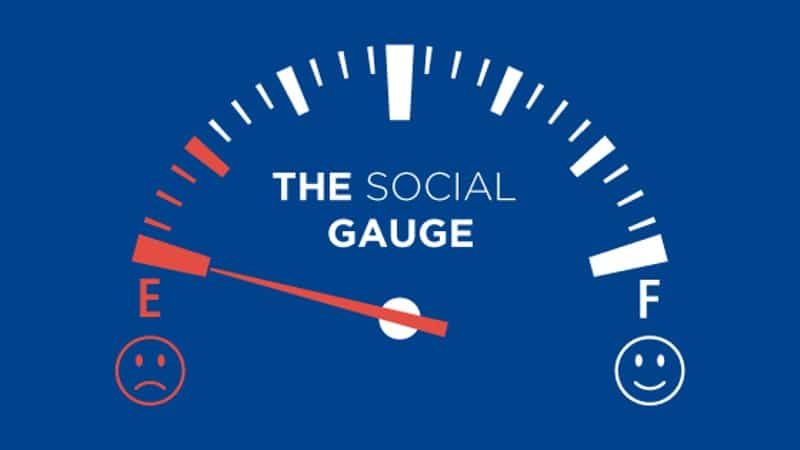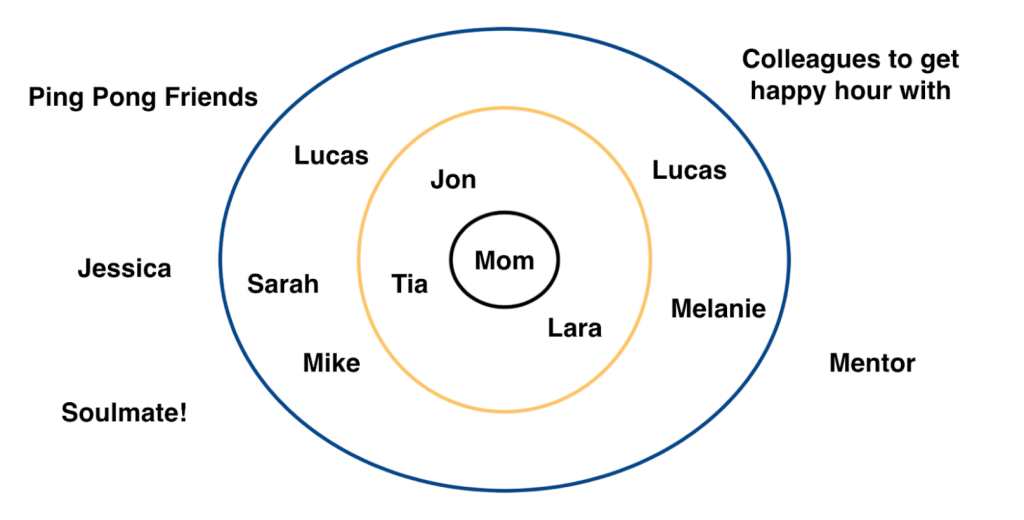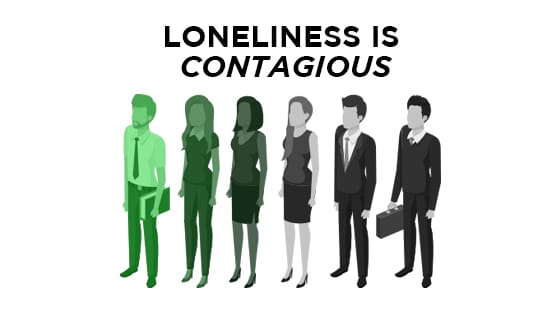This is part of our Remote Work Guide. Click here for more.
Remote Work Guide
Start learning everything you need to know about Remote Work.
If you’re here, chances are you’re feeling a little lonely, want to know how to deal with loneliness, and DON’T want to resort to making up imaginary friends to cope.
I’m here to help you!
That’s because I’ve been there. Thirteen years ago, I felt the most alone I had ever felt in my life. I was first starting my business, had very few friends, and felt very socially isolated. I also felt ashamed of my loneliness. I didn’t feel I could trust anyone enough to open up, so I was coping with the loneliness all by myself… and I made a lot of mistakes along the way.
When I was at my all-time-low, I barely recognized myself.
That’s because loneliness literally makes you a different person:
- You pretend to be happy around people even though you’re in pain inside.
- You feel your relationships are shallow.
- Seeing loving couples makes you angry.
- You get overly-attached to people when you’ve just met them.
- You constantly worry people won’t like you—at least if you are your authentic self.
- You rarely feel like getting out of bed, no matter how much sleep you get.
Cigna’s national survey on loneliness even revealed that loneliness is now an epidemic—nearly half of Americans report sometimes or always feeling alone! Are you one of them?
You are not alone.
What is Loneliness?
Loneliness is a negative feeling of being disconnected and isolated from other people. It happens when we have social needs that aren’t being satisfied through our current relationships.
And loneliness is more than just a feeling. Brain scans show that parts of the brain that control motivation, such as the ventral striatum, light up when we receive monetary and social rewards.
This part is absent from lonely people. Instead, brain regions associated with distress and rumination are lit up.
People who are lonely experience different brain activity than normal people.
Here’s the biggest challenge: when we start to feel lonely, we often isolate ourselves even more, which only makes the loneliness grow. Here’s what you need to avoid at all costs:
Avoid the Loneliness Slump
When you’re lonely, you enter into a state of being which I call…
The Loneliness Slump.
The Loneliness Slump is when everything just feels like a slog…
- Talking to people seems like a chore.
- You can’t seem to relax.
- The negative feelings overwhelm you when you’re trying to be productive.
- You’re overthinking and too focused during social interactions.
The Loneliness Slump is a big problem. Making friends is harder, conversations are more awkward, and everything seems to take more energy! It’s hard to climb out of this slump once you’ve fallen in.
And the reason you just can’t “snap out” of loneliness—even if you really want to—is because being less lonely is more than just analyzing your mood and understanding the root of your loneliness problems.
Here’s the good news: scientific research suggests that the best way to deal with loneliness is to change the negative thinking processes that loneliness can create. And I’m going to help you every step of the way!
This is the post I wish had been written for me all those years ago.
Taking action (even the smallest of small actions) is the hardest part of dealing with loneliness, but it’s the best remedy.
So instead of giving you some “anti-loneliness” knowledge to fill your head, I’m going to give you some actionable steps you can take.
Don’t Ignore It
Loneliness is not made up. You cannot just “get over it.” In fact, some research has found that loneliness is a change in your chemistry. Lonely people are chemically different.
Here are the chemicals affecting your mood and your feelings of loneliness:
OXYTOCIN

Oxytocin is nicknamed “the cuddle hormone.” It’s released when you’re close with other people, whether it’s your best friend, or someone who makes you laugh, or your Mom. It’s an essential part of making strong social bonds in our relationships and is key to feeling trust for other people.
- When you do not have enough oxytocin you feel a lack of connection.
CORTISOL

It’s your body’s main stress hormone and is your body’s built-in alarm system.
- When you have too much cortisol you feel panicky and filled with anxiety.
ADRENALINE

This is a hormone your body makes in moments of crisis. It makes the heart beat faster and work harder, increasing the flow of blood in your body.
- When you have too much adrenaline you feel constantly on edge and find it difficult to sleep, relax, or laugh.
Here’s my goal with this article: I want to give you tools to slowly regulate all three of these chemicals. The small activities outlined below that I have you do are actually the key to setting your chemistry right.
Cut to Add
Sometimes we think we’re missing something in our lives when we get lonely. Most of the time, we’ve just got too much:
- The television’s always showing reruns of Friends.
- Our eyes are glued to the latest Facebook and Instagram posts.
- The newest video games become a top priority.
- Our phone is our everything.
- We are watching news all the time.
- We are overburdened with work.
When you get rid of social blockers, you have more room for social bonds.
Do you notice a lot of these are oxytocin blockers? Spend too much time inside and in front of screens, and too little time in front of people, and you won’t get oxytocin. Spend too much time overindulging and with too much stress, and you have increased cortisol and adrenaline.
As human beings, we’re heavily biased towards short-term rewards and bad at seeing the long-term. When we try to replace our interpersonal relationships with these distractions, we tend to only get deeper into our addictions. As a result, we neglect our long-term and spiral deeper into loneliness.
Sound familiar? We are ALL guilty of giving into our addictions.
Loneliness should be your signal that it’s time to cut.
Let’s fill in the blank:
- What do you overindulge in? _________________________
- What is a casual addiction? _________________________
- What takes up too much of your time? _____________________
- What is standing in the way of your relationships? _________________
- What do you do instead of calling or texting someone you care about? _______________
Here are some common answers:
- Social Media
- News
- Food
- Sugar
- Shopping
- Drugs and alcohol
- Sex and porn
- Buying new things
- Gambling
- Television
- Phone use
- Video games
Action step: Pick your biggest vice and set limits. Reduce the time you spend with your addiction by using time limits, self-checks, and goals. Put a hard limit on yourself, such as “I will only watch television for one hour a day” or “I am only going to watch TV when I am exercising” or “I’m only going to use $X per week.” Remember, you can take small steps. This will lead to bigger steps in the long term!
Level Your Social Gauge
Everyone has different social needs. Ever wonder why some people can seem to shut themselves inside ALL DAY and be as happy as a Zen monk, while others need constant outings to feel satisfied?
Think of your social needs as a rechargeable battery—I call it the Social Gauge.

One of the underlying causes of loneliness is that it is hard for us to gauge how much social interaction we really need—until it’s too late.
We all have different social needs.
Which explanation sounds more like you?
- I am drawn to people; I get energy from social gatherings, and am fairly outgoing. (Extrovert)
- It’s draining to be around lots of people. I prefer peace, solitude, and quiet time. I usually crave alone time in my free time. (Introvert)
- It depends. (Ambivert)
If you are still unsure, take our extrovert – introvert – ambivert quiz right here.
Now we need to decide how much it will take to begin to curb your loneliness. Fill in the blank:
- When I was my happiest I had ___ closest friends.
- When I was my happiest I spent ___ hours per day with others.
- When I was my happiest I texted (all the time, frequently, rarely, never) with the people in my life I care about.
- When I was my happiest I emailed (all the time, frequently, rarely, never) with the people in my life I care about.
- When I was my happiest I called (all the time, frequently, rarely, never) the people in my life I care about.
- When I was my happiest I saw people in my life I care about (daily, bi-weekly, weekly, monthly, rarely).
This exercise is incredibly important because it is your social goal sheet! If you saw people weekly when you were at your happiest, we need to work you back up to that!
But how? Read on…
Take Stock of Your Relationships
Next I would like to help you through an exercise that is helpful for taking stock of your relationships. Take out a piece of paper and draw three circles like this:

Inner Circle: Now in your inner circle write the initials of people you are closest with—these are the people you feel know you the best. It is usually 1 to 3 people at most. If you feel no one truly knows you, that’s ok, leave this circle blank.
Middle Circle: In the next circle are the people who know you fairly well and you enjoy being with. These are all the folks you would celebrate your birthday with or enjoy following on social media.
Outer Circle: The last circle is people who you like seeing, but are not very close with. They can be people you know through other friends or colleagues who you enjoy working with. You can also include old friends here you would like to get back in touch with.
The outside: Outside all the circles please put the people you would like to know, but do not know yet. This can even be a type of person you would like to know, like a hiking partner or someone to play boardgames with, or an unmet romantic partner.
Here is a student named Skylar I worked with who allowed me to share her circle:

Some notes that might inspire you:
- She decided to put all personal people on the left and all work people on the right. You can see her Mom is in the middle.
- She also plays ping pong occasionally and would like to make friends with some of the folks she plays with.
- She would like a mentor at work as well as more colleagues to attend happy hour with.
- She would like to find a soulmate.
- A woman who lives in her building named Jessica seems nice—maybe they could be friends?
Fill yours out as completely as you can! Then…
Relationship Goals
This is the most important part of how to deal with loneliness. I want you to hone your relationship goals based on your relationship circles. Make a list of all the goals from the circles. I want you to start with the easiest ones first.
For Skylar they were:
Goal #1: Text Lara, Tia and Jon to check-in. It’s been way too long.
Goal #2: Join the mentor program at work.
Goal #3: When I see Jessica say hi—join for her dog walks?
Goal #4: Sign up for a dating app I am comfortable with.
Goal #5: Ask colleagues to join in on happy hour next. Or set-up a virtual happy hour.
Ideally your goals should match your social energy needs above.
Make as many of these goals as you can—the ones farther out can be harder. Now I want you to start with the very first goal.
Start small! A text is a great goal!
Simply reaching out to someone with a check-in is a great way to start. If you were texting with a lot of people when you were at your happiest, then this should be a longer list of people to text. If you only saw people once a week then make your goal simply to set something up once per week!
This is how we begin to create more oxytocin and lower our levels of cortisol and adrenaline. We just need many small positive interactions.
Action Step: Do one at a time and then work your way down the list. Then add more as you begin to spark new (and old) relationships.
Warm-Up with Small Talk
If you’re lonely, then your gauge is running on empty. Here’s some advice: “Just go out and socialize!”
This is OLD ADVICE! I know when you’re lonely, socializing can even seem like a chore. That’s why it’s important to start somewhere not so big… remember, small steps work!
A 2009 study in the Journal of Personality and Social Psychology showed that loneliness is like the flu or common cold—it can actually be very contagious!

Deep, meaningful conversations are wonderful, but small talk works too. I was pleasantly surprised to read this 2014 study by researchers at the University of British Columbia:
Loneliness can be combated by simply having “weak” social interactions.
“Weak” social interactions can be interactions that involve:
- A passing classmate
- The grocery store clerk
- Your neighbor you wave hello to
- The barista at the coffee counter
- A smiling stranger at the park
- Your mailman
These are your Passing People—the people in your life that you pass by and don’t expect to be good friends with. When your Social Gauge is totally empty, as when you’re feeling completely alone, having a simple conversation with a Passing Person in your life increases it just a little!
Any social interaction, no matter how small, can help with loneliness.
Simply making eye contact with someone improves oxytocin. So don’t neglect the Passing People in your life. And you never know… small conversations can always lead to bigger ones with the right people skills!
Action step: Strike up a small conversation with a Passing Person.
Step Up to Big Talk
Now that you have practiced with some small talk, let’s step it up. You know the people in your inner two circles? Try having some deep conversations with them. You can do these with people you live with or do them over text or video chat as well!
What’s one thing you have always wanted to try, but never have? Why haven’t you done it yet?
I LOVE this question. It always surprises me. I also ask this question over and over again to the people I love because their answers change! You never know what you might discover about someone.
What has been the highlight of your year so far?
We need to focus on the positive. This question is a great way to get people thinking and reminiscing about what’s good.
What book, TV, or movie character do you most relate to?
This is not an aspirational question—it’s not asking who you most want to be like. Rather, it’s asking who you think you are currently most similar to. This can be fun because it often turns into a group discussion and everyone can help think of characters you are reminded of! It can be fun and dramatic.
If you really want to create social ties and fight loneliness in a big way, I recommend doing 36 deep questions with someone you care about. These are specifically designed to deepen relationships.
I like to do one a day or one a week.
Bonus: Find Your Hachi
Don’t love conversation? I have another tip for you. Get a dog!
There’s a scene in the movie, Hachi: a Dog’s Tale, that shows just how loyal dogs can be. In the movie, a man named Parker finds a dog named Hachi and takes him home. After a while, Hachi forms a bond with Parker—Hachi loves Parker so much that he even waits for him at the train station after work!
Here’s the scene:
It may seem obvious if you already own a dog, but dogs are literally one of the best ways to deal with loneliness:
- Dogs are emotional responders—they’re even used to help people with PTSD.
- Dogs are (usually) happy to see you.
- They can understand many words we use.
- Dogs react to our body language and vocal tone.
- They provide warmth and fuzzy cuddles.
- You can rattle off all your problems to your dog… and their tail will still be wagging.
Getting a canine companion is especially important if you live alone, or lack a good social support system. Dogs sometimes even offer a level of social support that other humans can’t give—this is invaluable, especially if you’re an introvert.
Not convinced? Here’s some paw-some science!
One 2014 study published in BMC Geriatrics analyzed 5,210 older adults and found that those who owned a pet were less likely to report themselves as being lonely.
But is it just a coincidence? Nope! Another study in 2013 by the journal Aging and Mental Health found that pet owners are 36% less likely than non-pet owners to report being lonely.
Action step: If you already have a dog, great! Spend some more time with him or her. If not, take the time to look for a loyal canine companion (or even spring for a cat, too!).
Change Your Environment
Lonely people often feel trapped in their environment. They begin to associate their room, house, or apartment as a safe haven. This is the place where they are free from the dangers of the outside world!
But this is NOT productive to beating loneliness. In fact, you might feel like you’re in an existential crisis…or it even might drive you a little crazy.
Here’s why: a 2012 Gallup poll of more than 60,000 women found that:
- 28 percent of stay-at-home moms reported depression during the day.
- Only 17 percent of employed moms reported depression.
That’s an 11% increase in depression just from staying at home!
And it doesn’t take a lot to change your environment—all you need are small nudges. In the book, Mindless Eating, it’s the small things that truly change behaviors:
- If you use a big spoon, you’ll eat more.
- If you serve yourself on a big plate, you’ll eat more.
- If you move the small bowl of chocolates on your desk six feet away you’ll eat half as much.
- If you eat chicken wings and remove the bones from the table, you’ll forget how much you ate and you’ll eat more.”
Here’s the bottom line: Loneliness doesn’t get better without a little elbow grease. But you don’t have to do too much at a time. Take small steps—or large ones, if you want—and change your environment for the better! You can build your very own get-out-of-the-house ritual or simply change where you already are:
- Hang up your favorite posters and artwork throughout your environment.
- Rearrange the furniture.
- Spend more time in a different part of your house.
- Find a café to work from instead of staying home.
- Walk or cycle to work instead of driving (or take public transport).
- Rent/move to a different place.
- Travel to somewhere new.
- Move to a new city or country.
Again, you can do something super simple, or if you’re really deep in a Loneliness Slump… it might be best to go big.
Action step: Pick something from the list. Do it.
Pro tip: If you can’t change your environment, make your background noise social. Listening to background noise with active chatter can help you feel more socially connected with others.
- Set your TV to a stand-up comedy.
- Play a talk show on YouTube.
- Listen to a podcast.
- Turn your environment into a café.
Special Tip: Embrace the Warmth
One aspect of your environment you might not have considered… temperature! If you have been feeling lonely, you may literally have a cold shoulder. That’s right—being cold can literally make you feel more lonely. Do you remember that famous 2008 “hot cup of coffee” experiment? Yes, that’s the one where researchers discovered that people who held a warm cup of coffee viewed others as being “warmer.”
Well, there’s another study that says that being warm makes you more social, too. A 2019 study by researchers at Florida State University and the State University of New York found that cold days can actually make you feel lonely… so if you’re feeling a little blue because of the temperature, you’re not alone!
But here’s where the magic happens…
Another study in 2013 found that being physically warm can mimic the effects of social warmth! That’s because when you’re with a bunch of friends and feeling happy, you’re also physically warm inside, too!
Being physically warm can actually fill your Social Gauge!
So rev up your warm engines and warm up your body!
- Take a warm bath.
- Turn up the thermostat.
- Drink hot coffee or tea.
- Wrap yourself in a warm blanket.
- Double or even triple layer your clothes.
- Always wear socks, even in the house.
- Turn on the portable heater.
Action step: Pick one thing on the list and embrace the warmth!
Be Your Best Friend
A lot of this post is about your relationships with others, but I also have to address your relationship with yourself.
We need to make our alone time as beneficial as possible before we can benefit from relationships with others.
Did you know there’s research that shows we feel bad when we enjoy activities alone?
Especially when we think other people are watching us. That’s why when we enjoy a meal at a restaurant, go to the cinema, or take a stroll in the park by ourselves, we often pay too much attention to others.
- Am I being judged?
- Do I look silly?
- Is it wrong to have fun by myself?
But it’s totally okay. Who says it’s not cool to be your best friend?
It might sound silly, but make dates with yourself. Especially if you are spending a lot of time at home, you need to designate time you look forward to. Try this:
- Learning Hour: What have you always wanted to learn? Make a learning bucket list and then tackle one at a time.
- Creative Hour: Try a project, build something, paint something, take a virtual museum tour.
- Reading Hour: Start, finish, or get recommendations for a great new book. I also recommend trying books that will help you stimulate great conversations. Here are my favorite books to read.
- Meditation Hour: Meditation is one of the BEST ways to lower your cortisol and adrenaline. Check out our how-to post on meditation.
- Laughter Lunch: I used to work through lunch and then I realized I was not digesting well at all. Now I do a laughter lunch. You should join me!
- Fun Food: Eating right and enjoying your food is essential for happiness. You will love this post on the science of eating. Then, create a time where you cook, watch food documentaries. or learn about food.
When you are ready…try to go out at least once a day and do something by yourself. Learn to love going out by yourself! Try these things:
- City adventure! Pick an area of your city and just explore.
- Go to your local library or museums in your area.
- Try a new restaurant.
- Join a MeetUp.
- Set a budget and go to the mall.
- Go to a concert or sporting event.
- Watch a movie at the cinema.
Bonus tip: Take a hike! Stanford researchers found that taking a walk in nature could lead to a lower risk of depression:
- Participants who walked for 90 minutes in a natural area showed decreased activity in the depression areas of their brain compared to people who walked in high-traffic urban areas.
If you can’t go out in nature, bring nature to you! Another study found that 39% of people go to their gardens when they feel alone. Why? Because they have more conversations with their neighbors.
Who knew gardening could be so social?
Embrace Monophobia
If you’re afraid of being alone, you might have something called monophobia.
Monophobia (noun): a morbid dread of being alone
Back in the day of cavemen and cavewomen, it was perfectly fine to have monophobia. It made sense, because we needed a large group of people to survive. Being in a large group meant:
- Babies were easier to take care of.
- We had more resources.
- Enemies were easier to fend off.
But today, we’re different.
We’re not the cavepeople we used to be. Today, people can be perfectly fine being alone. Today, we can eat, breathe, sleep, and be in perfect condition without the need of a large social group. But today… most of us are not perfectly fine being alone.
When we are alone and lonely, the negative feeling is sometimes just too much to handle.
The bigger fear than monophobia is fearing ourselves.
So how do you get rid of monophobia? Before we get to that, let’s see why being alone can be good for you.
Being alone does not mean you are lonely.
In fact, being alone is a great time to use to your advantage. Thuy-vy Thi Nguyen, a social psychology researcher at the University of Rochester, found that spending time by yourself can have a calming effect. That’s because emotional extremes are blocked—both the positive and the negative. Being alone also has shown to increase creativity and problem-solving skills.
So if you’re alone, there’s no better time to make use out of it. Here’s an action for you!
Find out what you are most afraid of.
Write down a list of what makes you feel lonely when you’re by yourself. Is it because you crave social interaction? Because you want more friends? Write it down.
Being alone makes me feel lonely because ___.
When you’re done writing down your feelings, know that feeling lonely is perfectly okay and healthy. Everyone is alone, and regardless of how negative you might feel about being alone, it can change!
Action step: Meditate or journal at least 30 minutes a day. Try 15 minutes of breathing exercises (I like the Wim Hof method). Make the focus of your meditation on being comfortable with yourself.
And know that loneliness is an emotion that will leave eventually. You know how to deal with loneliness.. it just takes small steps at first.
Your loneliness is telling you something…
So believe in yourself and take action!
This is part of our Remote Work Guide. Click here for more.
Remote Work Guide
Start learning everything you need to know about Remote Work.

After reading this I realize I am in a state of chronic loneliness.
Perhaps you already felt it at some level but weren’t able to articulate it?
Do you have a language other than English? If you don’t, is there a language you would like to learn?
After reading this I realize I am in a state of chronic loneliness.
Perhaps you already felt it at some level but weren’t able to articulate it?
Do you have a language other than English? If you don’t, is there a language you would like to learn?
After reading this I realize I am in a state of chronic loneliness.
Perhaps you already felt it at some level but weren’t able to articulate it?
Do you have a language other than English? If you don’t, is there a language you would like to learn?
After reading this I realize I am in a state of chronic loneliness.
Perhaps you already felt it at some level but weren’t able to articulate it?
Do you have a language other than English? If you don’t, is there a language you would like to learn?
Me too. I live alone..my dog and cat help a lot . I feel disconnected. I dont have a tribe… my “people”. I try to maximize the pros of being alone… I find most neighbors to be negative and unpleasant so I keep to myself.
Hi Jackie.
I hope you dont mind me asking: are your neighbours too “close”, physically? By thst, I mean, do you find yourself in situations where you are “forced” into interactions due to circumstances?
At one time, I lived in a block of four flats in Europe. They were built in the 1930s & had a lovely view. But the flat next door had a front door thay was exactly opposite mine & with a shared stairwell that was only wide enough for one person to go up or down.
If you had your choice of a “good” neighbour, what would they be like?
Me too. I live alone..my dog and cat help a lot . I feel disconnected. I dont have a tribe… my “people”. I try to maximize the pros of being alone… I find most neighbors to be negative and unpleasant so I keep to myself.
Hi Jackie.
I hope you dont mind me asking: are your neighbours too “close”, physically? By thst, I mean, do you find yourself in situations where you are “forced” into interactions due to circumstances?
At one time, I lived in a block of four flats in Europe. They were built in the 1930s & had a lovely view. But the flat next door had a front door thay was exactly opposite mine & with a shared stairwell that was only wide enough for one person to go up or down.
If you had your choice of a “good” neighbour, what would they be like?
Me too. I live alone..my dog and cat help a lot . I feel disconnected. I dont have a tribe… my “people”. I try to maximize the pros of being alone… I find most neighbors to be negative and unpleasant so I keep to myself.
Hi Jackie.
I hope you dont mind me asking: are your neighbours too “close”, physically? By thst, I mean, do you find yourself in situations where you are “forced” into interactions due to circumstances?
At one time, I lived in a block of four flats in Europe. They were built in the 1930s & had a lovely view. But the flat next door had a front door thay was exactly opposite mine & with a shared stairwell that was only wide enough for one person to go up or down.
If you had your choice of a “good” neighbour, what would they be like?
Me too. I live alone..my dog and cat help a lot . I feel disconnected. I dont have a tribe… my “people”. I try to maximize the pros of being alone… I find most neighbors to be negative and unpleasant so I keep to myself.
Hi Jackie.
I hope you dont mind me asking: are your neighbours too “close”, physically? By thst, I mean, do you find yourself in situations where you are “forced” into interactions due to circumstances?
At one time, I lived in a block of four flats in Europe. They were built in the 1930s & had a lovely view. But the flat next door had a front door thay was exactly opposite mine & with a shared stairwell that was only wide enough for one person to go up or down.
If you had your choice of a “good” neighbour, what would they be like?
It’s a gorgeous article, Vanessa. I’m not lonely myself but my lonely friends would, I believe, find the solutions they need to overcome their being lonely. Thanks heaps for the article.
It’s a gorgeous article, Vanessa. I’m not lonely myself but my lonely friends would, I believe, find the solutions they need to overcome their being lonely. Thanks heaps for the article.
It’s a gorgeous article, Vanessa. I’m not lonely myself but my lonely friends would, I believe, find the solutions they need to overcome their being lonely. Thanks heaps for the article.
It’s a gorgeous article, Vanessa. I’m not lonely myself but my lonely friends would, I believe, find the solutions they need to overcome their being lonely. Thanks heaps for the article.
This a great article but being in quarantine by myself it doesn’t matter how many video chats or driveway visits it doesn’t change the fact I’m not just lonely I’m alone 95% of the time.
Hello there, Christine. Are you still in quaramtine?
You talk about driveway chats. How long is your driveway?
Driveway chats are no longer possible here. However, our chickens like to run down the driveway when they hear a voice. They aren’t good conversationalists, but they’d give Usain Bolt a rum for his money (& a lot more excited to see my face than Usain would be!)
This a great article but being in quarantine by myself it doesn’t matter how many video chats or driveway visits it doesn’t change the fact I’m not just lonely I’m alone 95% of the time.
Hello there, Christine. Are you still in quaramtine?
You talk about driveway chats. How long is your driveway?
Driveway chats are no longer possible here. However, our chickens like to run down the driveway when they hear a voice. They aren’t good conversationalists, but they’d give Usain Bolt a rum for his money (& a lot more excited to see my face than Usain would be!)
This a great article but being in quarantine by myself it doesn’t matter how many video chats or driveway visits it doesn’t change the fact I’m not just lonely I’m alone 95% of the time.
Hello there, Christine. Are you still in quaramtine?
You talk about driveway chats. How long is your driveway?
Driveway chats are no longer possible here. However, our chickens like to run down the driveway when they hear a voice. They aren’t good conversationalists, but they’d give Usain Bolt a rum for his money (& a lot more excited to see my face than Usain would be!)
This a great article but being in quarantine by myself it doesn’t matter how many video chats or driveway visits it doesn’t change the fact I’m not just lonely I’m alone 95% of the time.
Hello there, Christine. Are you still in quaramtine?
You talk about driveway chats. How long is your driveway?
Driveway chats are no longer possible here. However, our chickens like to run down the driveway when they hear a voice. They aren’t good conversationalists, but they’d give Usain Bolt a rum for his money (& a lot more excited to see my face than Usain would be!)
In Victoria, Australia, in full lockdown. 23hrs per day. Not allowed to go shopping. Violent police. Not able to go further than 5km from home. Don’t get to see human faces. Psychopathic political leaders who now want indefinite detention in indeterminate venue if they “think” there is a “possibility” that “any person” might be a “potential” health risk.
And the rest of the world carries on as if this is okay. People are traumatised. <20 people in ICU in the whole country but we've been in lockdown longer than Wuhan.
How's that for a "Well, that's interesting…!" conversation starter?
In Victoria, Australia, in full lockdown. 23hrs per day. Not allowed to go shopping. Violent police. Not able to go further than 5km from home. Don’t get to see human faces. Psychopathic political leaders who now want indefinite detention in indeterminate venue if they “think” there is a “possibility” that “any person” might be a “potential” health risk.
And the rest of the world carries on as if this is okay. People are traumatised. <20 people in ICU in the whole country but we've been in lockdown longer than Wuhan.
How's that for a "Well, that's interesting…!" conversation starter?
In Victoria, Australia, in full lockdown. 23hrs per day. Not allowed to go shopping. Violent police. Not able to go further than 5km from home. Don’t get to see human faces. Psychopathic political leaders who now want indefinite detention in indeterminate venue if they “think” there is a “possibility” that “any person” might be a “potential” health risk.
And the rest of the world carries on as if this is okay. People are traumatised. <20 people in ICU in the whole country but we've been in lockdown longer than Wuhan.
How's that for a "Well, that's interesting…!" conversation starter?
In Victoria, Australia, in full lockdown. 23hrs per day. Not allowed to go shopping. Violent police. Not able to go further than 5km from home. Don’t get to see human faces. Psychopathic political leaders who now want indefinite detention in indeterminate venue if they “think” there is a “possibility” that “any person” might be a “potential” health risk.
And the rest of the world carries on as if this is okay. People are traumatised. <20 people in ICU in the whole country but we've been in lockdown longer than Wuhan.
How's that for a "Well, that's interesting…!" conversation starter?
It would be very great to be married with a family for many of us that are still single today as i speak, which is certainly much better than being single and alone all the time by ourselves. The married people that were very very lucky to find love with one another and have children, are without a doubt the luckiest people in the world.
It would be very great to be married with a family for many of us that are still single today as i speak, which is certainly much better than being single and alone all the time by ourselves. The married people that were very very lucky to find love with one another and have children, are without a doubt the luckiest people in the world.
It would be very great to be married with a family for many of us that are still single today as i speak, which is certainly much better than being single and alone all the time by ourselves. The married people that were very very lucky to find love with one another and have children, are without a doubt the luckiest people in the world.
It would be very great to be married with a family for many of us that are still single today as i speak, which is certainly much better than being single and alone all the time by ourselves. The married people that were very very lucky to find love with one another and have children, are without a doubt the luckiest people in the world.